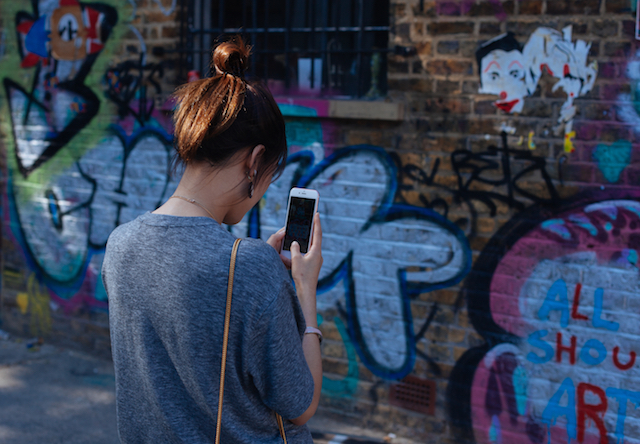I spend my work life illuminated by the soft glow of a computer screen, so I always surprise myself when the first thing I do upon returning home is open my laptop.
With the TV nattering in the background, I scroll through various articles and get distracted by the ping of new notifications. I open Instagram and feel the familiar flutter of envy at the sight of every beautiful somebody wearing a designer dress.
I do this every day, and I know I’m not alone.
Realizing I’ve spent the whole day in a wrinkled old shirt, I pop over to the website of my favorite store, consider buying something new over the chore of ironing what I already have. Before I even get to checkout, the guilt creeps in.
This is the kind of mindless consumerism that contributes to the destruction of the planet.
Then again, I am going out on Friday and would feel pretty self-conscious if I don’t wear something nice. Conflicted and confused, I daydream about a capsule wardrobe and traveling in a van.
It may seem silly, but I find myself overthinking in this manner on a daily basis. I’m struck by how confusing modern life can be. When I think of the world and how to be happier and more useful in it, I instantly get bogged down by the seemingly infinite possibilities—that, and the apparent reality that there are few actual choices within my reach.
I don’t think I’m alone in this confusion. People in the West may well be some of the luckiest humans on Earth today. Our basic needs are taken care of, we have extraordinary technology, and are offered more ways than ever to connect with our peers. Yet our young people, in particular, boast higher rates of depression, eating disorders, and anxiety than we’ve seen in the last 25 years.
How has this happened?
These days, the ways our modern world makes us unhappy is somewhat of a media obsession. Whether it’s social media prompting validation from our peers, the breakdown of genuine community, years of advertising exposure, or the infamous FOMO, we have hundreds of reasons to feel uneasy.
Solutions to this existential angst are just as plentiful. They range from minimalism to veganism, from entrepreneurship to giving up our jobs and traveling the world. Others recommend disconnecting from the internet completely, while some claim mindful eating is the cure. All these solutions have a common theme—rejecting a facet of modern life.
In my experience, it’s clear many these claims are right. Social media does prompt me to compare my life to the curated versions I see from my friends. I don’t feel a part of a wider community, and I think the information overload on the internet age has made it impossible to think clearly.
I don’t know whether to prioritize making ethical choices or if I should just lose those stubborn five pounds. Or maybe, this is all a call to lead a simpler life.
I’m drawn to the idea of simplistic, minimalist living. I know that consuming less is better for the environment, but I’ve also read articles on how this movement is just a middle-class indulgence and the idea of simplistic, rustic living is nothing more than an attractive, aspirational market.
How’s that for modern guilt?
I know that my lifestyle, even something as simple as walking into a supermarket to buy a steak, is unsustainable and only possible because much of the world’s population doesn’t have these choices. This bothers me a lot. It crops up in my mind every time I buy a dress just because it’s pretty. This nagging background guilt is pretty widespread in my mind.
How do we square this guilt with our own personal happiness?
Can we attempt to disengage from the modern world? It may seem selfish, but in a situation where an individual’s choice can’t possibly compete with the systematic beast that markets it back to us, it can be easier just to walk away.
As you have probably guessed, my thoughts about these things are emotional, fuzzy, and not particularly coherent. I’ve been given so many solutions—so much conflicting information—that I’ve been frozen into inaction.
Is there a solution?
Given the abundance of information making it impossible for me to commit to anything, maybe giving up the internet for a couple of months is the right answer. Or deleting the most distracting apps off my phone. Or perhaps I could only buy essentials for six months, just to prove I can.
There’s a reason most people don’t do these things—modern life is convenient, and as much as it may impact us negatively, in other ways it improves our lives immeasurably.
We don’t need to reject modern life to live well. Thinking we have to do something drastic or impressive often stops us from doing anything at all. Similarly, we can fall into the trap of thinking we’ll find happiness as soon as we get that promotion, have a cash windfall, or get married.
We think the only way to be content is through a total life overhaul.
It may seem like small changes couldn’t possibly make a difference, but think about it: Cumulatively, how could they not? Taking a look at our lives and thinking about what has an impact on our happiness and the world around us allows us to make small, yet considered choices.
Living happily and ethically is about learning to balance our personal well-being with our duty to have a positive influence on the world around us.
It is more than possible, as long as we remember that all we can do is our best.
Author: Holly Ashby
Image: Clem Onojeghuo / Unsplash
Editor: Danielle Beutell







Read 0 comments and reply